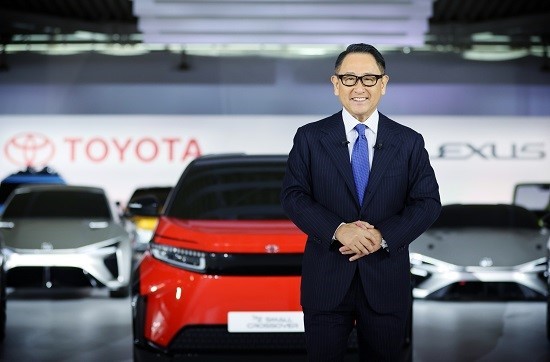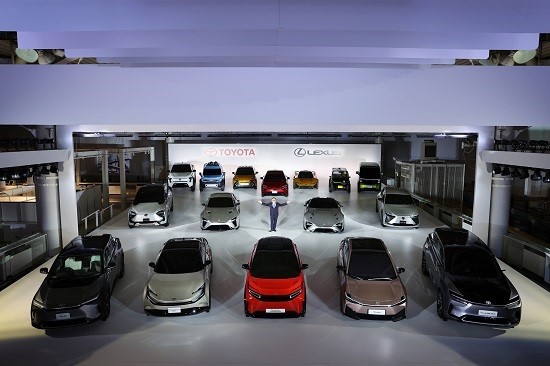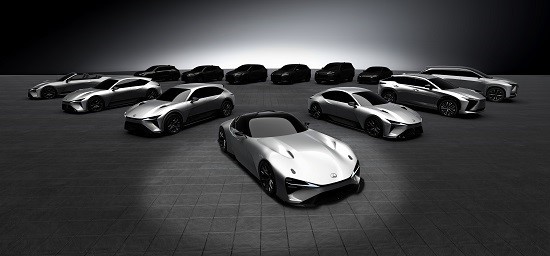Akio Toyoda, Toyota’s boss, shocked the automotive world by
unveiling 15 fully electric concepts previewing future models of
Toyota and
Lexus, during a world premiere event held in Tokyo last week. The event could
be the largest rollout of concept cars in history, including everything you can
imagine, from city cars, sedans, SUVs of all shapes and sizes to pickups and
sports cars. Some of them are based on existing models, but there are also
several all-new vehicles based on the EV-dedicated e-TNGA architecture.
اضافة اعلان
The Japanese car industry guru categorized the vehicles into
two types, carbon-reducing (HEVs, PHEVs, etc.) and carbon-neutral vehicles.
Toyota seems to be fast-tracking its electrification
ambitions with additional investments to be a global leader and overtake giants
such as Tesla, which has now become the most valuable carmaker. Tesla surpassed
Toyota and
VW in valuation as it reached over $1 trillion in October 2021.
 (Photos: Toyota Motor Corporation)
(Photos: Toyota Motor Corporation)
Toyota’s new line of electrified vehicles, dubbed the Toyota
bZ range (beyond Zero), of “reasonably priced mass production models”, includes
the
bZ4X and four new concepts, all based on the e-TNGA architecture. Among
those, there is a sporty compact crossover with a coupe-style roofline (bZ
compact SUV), a B-SUV (bZ small Crossover) design for Europe and Japan with the
goal of a 125 Wh/km power consumption, a high-riding mid-size sedan (bZ sdn)
looking like a Tesla Model 3 rival, and a large family-focused three-row SUV
(bZ Large SUV).
On the other hand, Lexus is the premium brand of the
Japanese automotive conglomerate. The lineup for the Lexus brand includes its
first dedicated EV called the RZ, which is the production version of the LF-Z
Electrified concept. Then there is a sports battery EV that looks like the
spiritual successor of the LF-A, with an expected cruising range of over 700
km, thanks to solid-state batteries, and an expected 0-100 km/h acceleration in
the low 2-second range.
Additionally, there is a full-size prototype of a large SUV
(Lexus Electrified SUV) and an unnamed Lexus-branded sporty sedan. The latter
also appeared in hatchback form in the official renderings, alongside a 2+2
cabriolet featuring similar styling.
 (Photos: Toyota Motor Corporation)
(Photos: Toyota Motor Corporation)
The reveal extravaganza included another series of models
called “the diverse Toyota EVs”. These include commercial vehicles like an
autonomous shuttle bus, a compact van designed for both business and leisure,
and a versatile urban EV.
The Compact Cruiser EV incorporates styling features from
the
FJ Cruiser in what could become an off-road-focused five-door EV. Next to
it, there is Toyota’s first electric dual-cab pickup, which appears to be
similar to the Hilux or the Tacoma in terms of dimensions, but gets modern
design features inspired by the larger Tundra.
The Small SU EV looks like an electric
CH-R with a dynamic
styling approach, while the Crossover EV is slightly larger and more subtle in
terms of exterior design, likely previewing Toyota’s entry into the C-SUV
segment. Finally, there is an EV sports car with mid-engine proportions and a
two-seater cabin, which could become the future MR2 serving as Toyota’s treat
for petrolheads.
 (Photos: Toyota Motor Corporation)
(Photos: Toyota Motor Corporation)
Bakar Sadik Agwan, senior automotive consulting analyst at
GlobalData, a leading data and analytics company, offers his view: “Toyota made
several amendments to its earlier existing plans which include increasing
battery electric vehicle (BEV) line-up from 15 to 30 vehicles by 2030. The
investments in battery production have also been increased to JPY2 trillion
($17.5bn) from the earlier announced JPY1.5 trillion ($13.2bn). The target for
BEV sales globally by 2030 has been revised to 3.5 million units from the
earlier announced 2 million units, which includes both BEVs and FCEVs.
“Toyota has a strong heritage in electric and fuel cell
vehicles. However, the present market scenario is highly dynamic due to entry
and rapid expansion of new technology companies and traditional automakers into
the EVs space. The fast-tracking of EV milestones will enhance Toyota’s
competitive position in the market as well as on the stock market.”
Read more Drive



